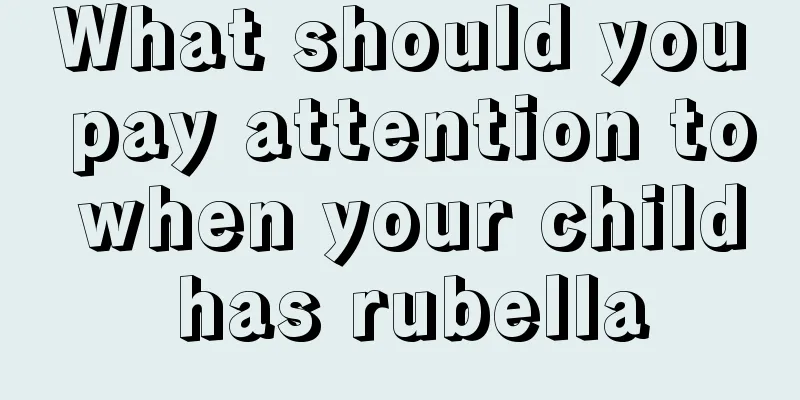What should you pay attention to when your child has rubella

|
If a child develops rubella, parents must pay attention to careful care and send the baby to the hospital for diagnosis and treatment in time. Never give the baby medicine privately and do not let the baby be exposed to the wind to prevent cold, so as not to aggravate the condition. If the baby has rubella and fever, be sure to let the baby drink plenty of water, and give the baby a light diet and eat more easily digestible food. Parents need to take preventive measures. During the rubella epidemic, they should not take susceptible children to public places and avoid contact with children with rubella. Protect pregnant women, especially in the first 2-3 months of pregnancy, from contact with children with rubella. If a child with rubella is found, he or she should be isolated immediately and kept isolated for 5 days after the rash appears. Rubella is highly contagious, so women are advised to avoid becoming pregnant during the rubella epidemic or to receive a full course of rubella vaccination before becoming pregnant, which can effectively prevent the disease. Symptoms of rubella in children Prodromal period: usually half a day to one day and is easily overlooked. Symptoms are generally mild and may include fever, cough, sneezing, runny nose, red throat, headache, pain behind the eyes, conjunctival congestion, loss of appetite, and a few may be accompanied by vomiting and diarrhea. The fever is generally between 38 and 39 degrees Celsius and lasts for 1 to 2 days. In a few children, needle-sized red maculopapules may be seen on the mucosa of the soft palate and pharynx when the disease first occurs. These maculopapules may merge into patches, which is called mucosal rash. Helps with diagnosis. 1 to 2 days before the rash appears, the symptoms are mild or there are no obvious prodromal symptoms. There may be low or moderate fever, accompanied by mild upper respiratory tract inflammation such as headache, loss of appetite, fatigue, cough, sneezing, runny nose, sore throat and conjunctival congestion; occasionally vomiting, diarrhea, epistaxis, swollen gums, etc. Some patients may have rose-colored or hemorrhagic macules in the pharynx and soft palate. How to prevent rubella in children 1. Vaccination The most effective measure to control and prevent rubella is to get vaccinated with rubella vaccine, which has a prevention effect of up to 90%. 2. Control the source of infection. Patients should be isolated and treated in a timely manner for one week after the rash appears. The patient should rest in bed and be given vitamins and nutritious and easily digestible foods, such as chopped vegetables, minced meat, rice porridge, etc. Pay attention to skin cleanliness and hygiene to avoid scratching the skin and secondary bacterial infection. 3. Schools and childcare institutions should strengthen medical observation of close contacts, and seek medical attention promptly if rashes or fever occur. During the epidemic, morning inspections should be strengthened and new students should be stopped from being admitted. 4. During the rubella epidemic, do not take susceptible children to public places and avoid contact with children with rubella. Protect pregnant women, especially during the first 2 to 3 months of pregnancy, and avoid contact with people with rubella. |
<<: What causes rubella in children?
>>: Which department should I go to for phimosis surgery on my child?
Recommend
What should I do if my child has chickenpox and a fever?
Infants and young children are very prone to chic...
Symptoms of navel infection in newborns
Newborns have to rely on their own bodies to resi...
What is nutritious for children to eat at night?
For children, the most important thing is to grow...
The child always blinks hard
Our eyes blink every few seconds, which is a norm...
Pus in the child's ear
Children often touch things when adults are not p...
Hernia reduction in children
Children are very prone to hernia. Since they cry...
Causes of knee pain in children
We know that knees are of great significance to t...
Treatment for measles
I believe everyone is familiar with diseases like...
Reasons for low total protein in babies
If the baby's total protein is low, parents m...
What should six-year-old children eat to supplement calcium? This thing is indispensable!
In daily life, many foods contain some nutrients ...
Is herpes virus contagious in children?
Children's physical resistance is relatively ...
My child has a fever of 39. How can I adjust it?
Children have weak constitutions and are easily i...
Parenting knowledge for children aged 0 to 6 months
How to raise a newborn baby? This is a topic that...
Can children with bloating eat fish?
When we feel stomach discomfort, we often go to t...
One year old baby's anus is red
Because babies do not have the ability to urinate...









